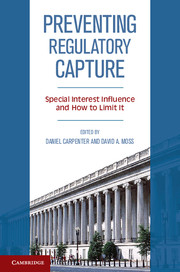Book contents
- Frontmatter
- Contents
- List of Figures
- List of Tables
- Editors
- Contributors
- Preface
- Acknowledgments
- Introduction
- Section I Failures of Capture Scholarship
- Section II New Conceptions of Capture – Mechanisms and Outcomes
- Section III Regulatory Case Studies
- 8 Capturing History
- 9 Conditional Forbearance as an Alternative to Capture
- 10 Captured by Disaster? Reinterpreting Regulatory Behavior in the Shadow of the Gulf Oil Spill
- 11 Reconsidering Agency Capture During Regulatory Policymaking
- 12 Coalitions, Autonomy, and Regulatory Bargains in Public Health Law
- Section IV The Possibility of Preventing Capture
- Conclusion
- Afterword
- Index
- References
11 - Reconsidering Agency Capture During Regulatory Policymaking
Published online by Cambridge University Press: 05 June 2014
- Frontmatter
- Contents
- List of Figures
- List of Tables
- Editors
- Contributors
- Preface
- Acknowledgments
- Introduction
- Section I Failures of Capture Scholarship
- Section II New Conceptions of Capture – Mechanisms and Outcomes
- Section III Regulatory Case Studies
- 8 Capturing History
- 9 Conditional Forbearance as an Alternative to Capture
- 10 Captured by Disaster? Reinterpreting Regulatory Behavior in the Shadow of the Gulf Oil Spill
- 11 Reconsidering Agency Capture During Regulatory Policymaking
- 12 Coalitions, Autonomy, and Regulatory Bargains in Public Health Law
- Section IV The Possibility of Preventing Capture
- Conclusion
- Afterword
- Index
- References
Summary
This chapter, and the volume in which it resides, suggests the need to reconsider the theory of agency capture. Few constructs within the study of American politics and policymaking are more widely discussed than agency capture. However, although scholars, politicians, and the media frequently employ the idea of agency capture, there is neither a clear definition of the construct nor a common way to identify it. In this chapter, I begin to address these shortcomings in three main ways. First, I define agency capture, which I suggest is the control of agency policy decision making by a subpopulation of individuals or organizations external to the agency. Second, I put forward a two-prong test for identifying capture that separates the constructs of “influence” from “control.” I argue that influence is a necessary but not sufficient condition of capture. Third, I provide an empirical assessment of these constructs by applying them to a sample of rules from the U.S. Department of Transportation.
Tasked with filling in the details of congressionally passed statutes, public agencies routinely propose and promulgate legally binding rules and regulations. Although the scope and topics of rules vary dramatically, some of our key public policy battles have been fought and decided via rules. For instance, existing rules specify standards for automobile emissions, clean water, and workplace safety; moreover, forthcoming rules may set requirements for state health exchanges and capital bank standards. In short, rules matter, and so does “rulemaking,” the political and policymaking process by which agency rules are formulated.
- Type
- Chapter
- Information
- Preventing Regulatory CaptureSpecial Interest Influence and How to Limit it, pp. 292 - 325Publisher: Cambridge University PressPrint publication year: 2013
References
- 5
- Cited by



